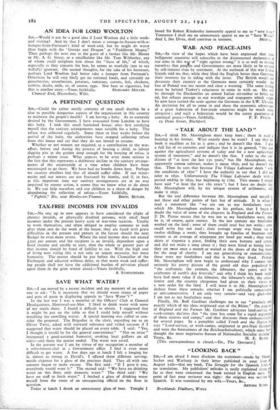TALK ABOUT THE LAND "
think Mr. Massingham must keep bees ; there is such a buzzing in his bonnet. What exactly does he want? I say that his book is excellent as far as it goes ; and he doesn't like that. I give a full list of us contents and indicate that it is in general, "the _ against the agricultural systems of today and for a new agricultural system of tomorrow," and he doesn't like that. I refer to the con- ditions of "at least the last 15o years," but Mr Massingham, wh apparently cannot subtract, makes it mean 183o, and he doesn't Re that. Then he says that because The Village Labourer deals " with the conditions of 1830." I have the audacity to say that I did no: refer to 1830. Unfortunately The Village Labourer deals with period. ending in 183o, but beginning in 17613. This means I shou:.: have said " at least the last 18o years "; but I have no doubt thy: Mr. Massingham will, by his unique system of arithmetic, st.1. make it 1830.
But the real difference between Mr. Massingham and myself
not these and other points of fact but of attitude. It is when I read a statement like " we are not as our forefathers were; which Mr. Massingham endorses in his preface, that I begin to doubt the value of some of the chapters in England and the Fanner. If Dr. Picton means that he was not as my forefathers were, then he is, of course, quite correct. In the last century my forefathers worked on the land ; most of them could read but not write ; some could write but not read ; their average wage was from six to twelve shillings a week; they brought up families of fourteen cum sixteen at an average of ninepence per head per week ; they made shirts at sixpence a piece, finding their own buttons and cotton. and did not make a song about it ; they were hired at hiring fairs: they ate meat once a month or waited at the doors of the big house for the soup of charity. I am not generalising or romanticising; these were my forefathers and this is how they lived. Perhaps Mr. Massingham will now begin to understand why I cannot take seriously his pretty picture of the grand old days populated by " the craftsmen, the yeomen, the labourers, the poets and the celebrants of earth's due festivals," and why I think his book might have had more value if the labourer, the labourer's wife, the educa- tionist and the country clergymen had given us their views on a new order for the land. I will leave it to Mr. Massingham to deduce froth these remarks whether I am politically conservative or anti-conservative. I am only very certain—and very glad—that I am not as my forefathers were.
Finally, Mr. Rolf Gardiner challenges me to say " precisely and exactly which of my ideas originated east of the Rhine." On page 97 of England and the Farmer Mr. Gardiner advocates land-service, or work-camps, declares that " the time has come for a rapid expansion of these courses and camps," and then discusses them enthusiastically for several pages In a pamphlet called Youth and the Nation he says " Land-service, or work-camps, originated in pro-Nazi Germml and were the forerunners of the Reichsurbeitsdienst, which some have thought the most impressive feature of Nationalist Socialist training? Yours, &c.rat.1.orE. Rims. [This correspondence is closed.—En., The Spec-


























 Previous page
Previous page